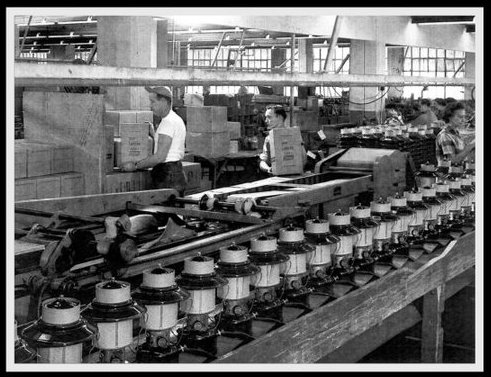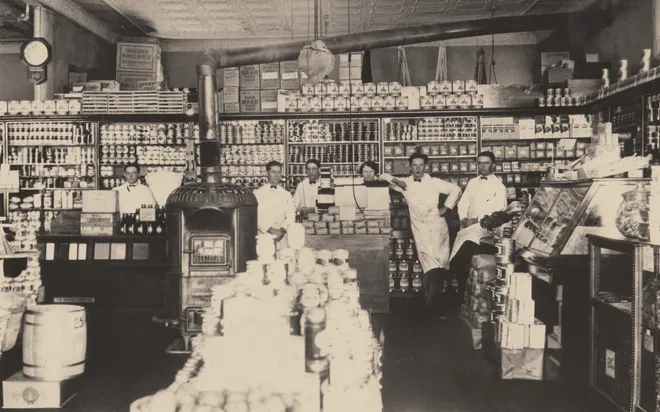HOME | ABOUT US | MEDIA KIT | CONTACT US | INQUIRE
HOME | ABOUT US | MEDIA KIT | CONTACT US | INQUIRE
Global enterprises and titans of commerce succeeded in business by drawing on common values of hard work, innovation and vision.

PUBLISHED NOVEMBER 2024
Kansas entrepreneurs have changed the world.
An idle boast? Just check the record. Other elements of this special issue focus on the biggest names in business leadership over the past 50 years. But those leaders achieved spectacular results in part because of visionaries who created a Kansas-specific culture of success. It was built across business sectors. It came one enterprise at a time.
In some cases, those early entrepreneurs who would make their mark on a global scale were raised here, carrying their dreams and a hard-honed work ethic to every corner of the country. Consider these native Kansans who went on to phenomenal success in their chosen fields:
• Walter Chrysler, the automotive pioneer whose story was shaped by life in two Kansas communities that claim hometown bragging rights: Wamego, where he spent his early years, and Ellis, where he came of age before heading out to start the car company that would bear his name.
• Robert Eaton, who grew up in Arkansas City, earning 35 cents a day delivering 100 copies of the local newspaper. Like Chrysler, he made it big in vehicle manufacturing—even following the former’s footsteps to become CEO of Chrysler, following a stint as president of GM Europe.
• Alan Mulally, who became CEO of Ford Motor Co.—What is it about Kansans and cars?—After a long run as CEO of Boeing.
• Warren Bechtel, who came out of Peabody High School and went on to found what today, is still one of the 20 biggest contracting companies in the world.
More recent figures include Lee Scott, a Pittsburg native who as president and CEO of Walmart, increased its position as the world’s No. 1 retailer; Topeka native Carl Ice, who became president and CEO of BNSF Railway; Philip Anschutz, the serial entrepreneur from Denver who remains one of Kansas’ largest land-owners (250,000-plus acres in the southwest part of the state); and Linda Zarda Cook, a Shawnee native and KU grad who rose from petroleum engineer to CEO of Royal Dutch Shell in Europe.
What’s Kansas famous for producing today? Most folks would think “wheat.” But what a place is famous for might not present a full picture. Wheat narrowly and agribusiness broadly do account for one of the biggest export sectors in the state. But other crops make up a large share of the ag output, as does the protein chain. Combined with the might of a massive ranching-meatpacking sector, agribusiness directly contributed $57 billion and 140,055 jobs to the state economy, the Commerce Department says.
A giant in that space was J.J. Vanier, who made a fortune in grain milling in central Kansas before investing heavily in ranchland property, creating what is now the 16,000-acre CK Ranch in Brookville and Ellsworth counties. Operations like his, and later, of the Gardiner family in southwest Kansas around Ashland, have helped make the state the nation’s top producer of U.S. beef by head count.
Their presence, in turn, attracted national beef-processing companies like Cargill, U.S. Premium Beef and National Beef, who employ tens of thousands of workers butchering, processing and packaging beef for domestic and foreign consumption.
Kansas is also a manufacturing state, and even within that broad category, aviation manufacturing is the driver. Or should we say, pilot? And that started with a remarkable gathering of entrepreneurial talent after World War I made air combat—and soon, air travel—possible at scale.
Wichita was the happy beneficiary of that influx, which drew in aviation pioneers like Clyde Cessna and, later, his nephew, Dwayne Wallace, with Cessna Aircraft. That same era saw the arrival of Walter Beech, who founded what would become Beechcraft. Another one getting in on the early aviation game was Lloyd Stearman, whose biplane enterprise would evolve into a division of The Boeing Co. A few decades after they began mass-producing single-engine planes came a pioneer in the jet space, Bill Lear, who popularized the idea of corporate jet travel and ownership with Learjet.
It’s impossible to overstate the impact that those founders had on Wichita then and yet today, even if the organizational structures have changed. Cessna and Beechcraft have long been subsumed into the Textron conglomerate as separate operating units in its aviation division. Learjet became part of Canada’s Bombardier, with production of new models canceled after 2021 as the company shifted its focus to servicing existing models. Boeing, which operated a military aircraft division in Wichita, sold off its operation there to create Spirit AeroSystems, which was re-acquired by its parent just this year.
Combined, the Wichita operations of those companies account for nearly 20,000 direct employees in Wichita. City officials believe that an equal number of jobs there can be attributed to vendors and suppliers in the aviation sector. Their aggregated impact accounted for a huge share of the state’s $26.34 billion in manufacturing GDP last year.
 Other key manufacturing pioneers included William Coffin Coleman, who salvaged the struggling gas-lantern company founded by his father and turned the family name into the nation’s best-known brand of camping and outdoor recreational gear. His leadership of The Coleman Co. also made it one of the biggest employers in Wichita.
Other key manufacturing pioneers included William Coffin Coleman, who salvaged the struggling gas-lantern company founded by his father and turned the family name into the nation’s best-known brand of camping and outdoor recreational gear. His leadership of The Coleman Co. also made it one of the biggest employers in Wichita.
Another was Henry David Lee, who, in 1889, began producing denim workwear in Salina, setting the stage for Lee Jeans, which eventually moved production and its headquarters to the Kansas City area before its relocation to North Carolina in 2019.
For all-around entrepreneurship, there’s Junction City’s Fred Bramlage. Most who know the name associate it with the basketball arena he helped fund at K-State, but he was the consummate serial entrepreneur who had ownership stakes in a score of companies, including petroleum, banking (he said at one time he held interests in half a dozen banks), real estate development and beverage bottling and distribution, among others.
Similarly positioned with multiple successful ventures was Ross Beach of Hays, who prospered in banking, radio and television, and oil and gas. He and his wife, Marianna, were a formidable force in philanthropy, especially with their contributions to education and the arts.
Also in the banking space, Charles Q. Chandler II, who bought his first bank in the state in the late 1880s, helped set the stage for companies that remain pillars of the sector today. His First National Bank of Kansas, rebranded as INTRUST Bank in 1992, remains the biggest hometown bank in the state’s biggest city. Another outsized figure was Henry Bubb, who was still in his teens when he started as a clerk at Capitol Building and Loan Association but eventually took the reins and for more than a quarter-century steered its growth as Capitol Federal Savings & Loan.
 In the retail space, Hutchinson’s Ray Dillon led the expansion of the grocery chain that still bears the family name, though ownership long ago fell to Kroger Co., and is perhaps the best-known grocery brand outside the Kansas City market; today, it has 600 outlets and 25,000 employees in a dozen states because of his work to carry the brand across the Midwest and as far away as California.
In the retail space, Hutchinson’s Ray Dillon led the expansion of the grocery chain that still bears the family name, though ownership long ago fell to Kroger Co., and is perhaps the best-known grocery brand outside the Kansas City market; today, it has 600 outlets and 25,000 employees in a dozen states because of his work to carry the brand across the Midwest and as far away as California.
Another iconic name was that of Alva Lease Duckwall, whose modest department stores were staples of small-town life in Kansas, serving as the forerunners to bigger retailers like Walmart today.
Two other fields—communications and energy—would produce a pair of the state’s biggest business growth stories of the past century.
Just before the turn of the 20th century, an Abilene entrepreneur, Cleyson L. Brown, jumped on the wagon of a technology that was working its way into rural America. His Brown Telephone Co. would navigate a series of organizational and ownership twists and turns before eventually emerging as Sprint Corp. Until it was merged into T-Mobile in 2020, Sprint had grown into one of the nation’s biggest telecom companies, with annual revenues peaking above $33 billion and a national workforce of more than 40,000 at its zenith.
Perhaps the grandaddy of them all was Fred C. Koch, a petroleum engineer who had revolutionized oil refining with the development of thermal cracking, greatly increasing the efficiency of gasoline production. His Wood River Oil & Refining Co., known to the world today as Koch, is the nation’s second-largest private company, trailing only Cargill, with revenues of $125 billion a year from its vast holdings in energy, manufacturing, consumer goods and emerging industries.